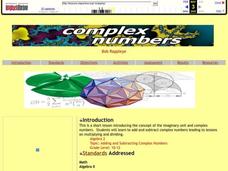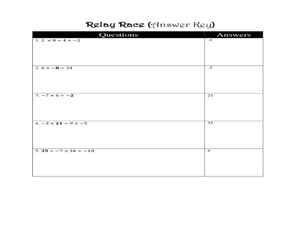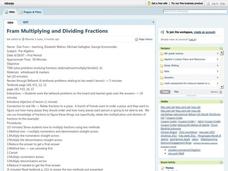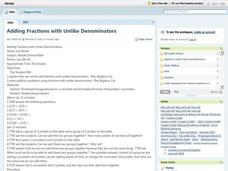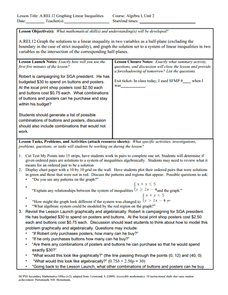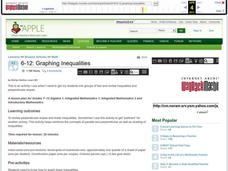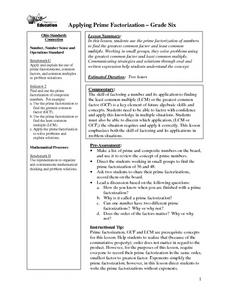Curated OER
What's My Pattern?
Students recognize, describe and extend patterns in three activities. They organize data, find patterns and describe the rule for the pattern as well as use the graphing calculator to graph the data to make and test predictions. In the...
Curated OER
Quilting with Middle School Students: Using Proportionality to Develop Quilt Designs
Young scholars use quilt patterns to illustrate ratios. In this fractions lesson plan, students color quilt patterns using given fractions and ratios of colors. A finished "quilt" is assembled from the work of the young scholars. This is...
Curated OER
I Have a Magic Pot
Pupils will explore numbers rules. They will create a picture of their rule and exchange their paper with a classmate. The classmate works to figure out the rule. They then share with each other how they found the rule. Questions are...
Ohio Department of Education
The Solution is Complex
Consider complex numbers, roots, and quadratic equations. Use the discriminate as a way to determine the nature of a quadratic's roots. Then discuss the similarities and differences between quadratics with two, one, or no real roots....
Curated OER
Complex Numbers
Learners are introduced to the concept of imaginary unit and complex numbers. They are taught how to add and subtract complex numbers. Young scholars define a complex number. They comprehend at least two applications of complex numbers....
Curated OER
Multiplying and Dividing Integers/Relay Race
Give your class a list of multiplication and division sentences that contain both positive and negative integers. Have them analyze them to see if they can discover the pattern with the signs. From these patterns, help them develop the...
Curated OER
Mini-Metric Olympics
Eighth graders participate in the mini-metric Olympics. In this measurement lesson, 8th graders solve real-world problems that require them to calculate length, area, and volume in metric units.
Curated OER
Human Number Line
Students compare different types of numbers. Each student is given a flashcard containing a decimal, percent, fraction or integer. Teams of students compete, in silence, to determine who can line up in numerical order correctly. They...
Curated OER
Multiplying Fractions
Middle schoolers investigate the concept of multiplying fractions and use the inverse for doing division. They practice working the problems with scaffolding provided by examples with the teacher. The link is made to real life with the...
Curated OER
Multiplying Polynomials - FOIL
Students participate in an activity to demonstrate the distributive property. They take notes as they observe different methods of FOIL. Afterward, students work on their own, and in groups to determine which method to use and complete...
Curated OER
Finding Total Given Part and Percentage
Students observe models of fractional parts. After writing the definitions of percent, part and whole, students use the calculators and computers to solve problems. Individually, they complete assigned problems where the convert the...
Curated OER
Fractions Continued
Learners investigate the concept of using fractions to solve problems involving rational numbers. They order real numbers on the number line with the classification of fractions. Also students solve problems using the four operations...
Curated OER
Variables and Patterns: Determining an appropriate scale while graphing
Sixth graders determine appropriate scales when graphing data. In this graphing lesson, 6th graders use an the applet "Graph It" to determine what is an appropriate scale for their data.
Curated OER
Exponents III- Squares and Square Roots
Students explore the process of inverse operations to solve square root problems. After exploring the perfect squares and area, students examine methods to find square roots by observing the teacher, taking notes, and listing vocabulary...
Curated OER
Linear Equations Data Tables
Pupils graph linear equations on a Cartesian plane. After describing data tables and their use, students explore how the information from a table can be used to create a line graph. They discuss reasons for plotting a minimum of three...
Curated OER
Hunter Fred's Quest for Dinner
Learners solve problems using trigonometric functions, specifically a problem about a tree stand. Pupils try to maximize the distance of hunting sight given certain restrictions. They use the Pythagorean Theorem, sine, cosine, and...
Curated OER
Properties of Logarithms
Students explore the concept of logarithms. In this logarithms lesson, students discuss the logarithm properties. Students use linear functions as a basis to develop the logarithm properites by substituting log b and log a for x and y.
Curated OER
What's the Best Deal?
Young scholars explore number sense by solving consumer math problems. In this pattern identification lesson, students analyze a list of numerical and geometric patterns while predicting the future outcome. Young scholars utilize...
Curated OER
Adding Fractions with Unlike Denominators
Students view groups of pickles and discuss putting the groups together. Next, they discuss a group of pickles and cucumbers, can these be put together? Students listen as the teacher explains equivalent fractions and ways to change...
Curated OER
Squares and Square Roots II
Students evaluate squares and square roots. Through practice, they discover the inverse relationship between squares and square roots. Students take notes, solve square root and square root problems, and classify numbers as rational or...
Curated OER
Graphing Linear Inequalities
Eighth graders extend skills for representing and solving linear equations to linear inequalities. Lesson activities build understanding and skill by plotting ordered pairs of numbers that either satisfy or do not satisfy a given...
Curated OER
Graphing Inequalities
Students graph linear equations and then find the person in class whose linear equation graph is perpendicular to theirs. In this graphing inequalities lesson plan, students graph their perpendicular slopes and then once their find their...
Curated OER
Applying Prime Factorization
Sixth graders use the prime factorization of numbers to find the greatest common factor and least common multiple. Working in small groups, they solve problems using the greatest common factor and least common multiple.
Curated OER
Talk the Talk
Students interactively learn multimedia terminology while using the Alice Programming. In this multimedia lesson plan students become the director of a movie or video game.






